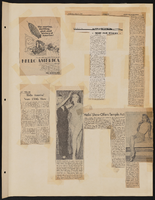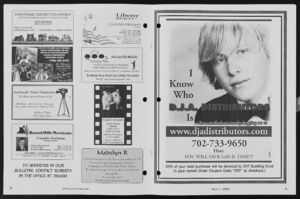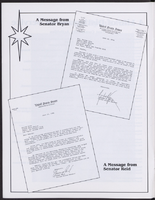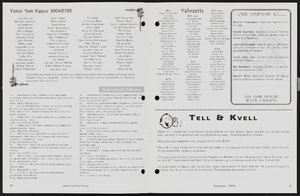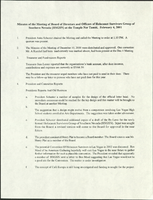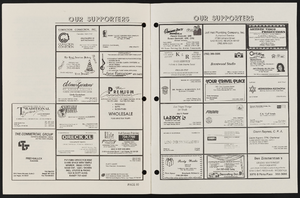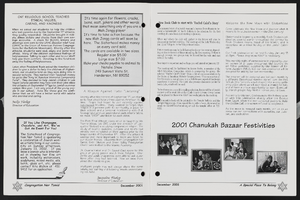Search the Special Collections and Archives Portal
Search Results

Dorothy Eisenberg interview, March 8, 2017: transcript
Date
Archival Collection
Description
Multicultural advancements in Las Vegas cannot be mentioned without speaking on the monumental contributions of Dorothy Eisenberg. From 1971 to 1998, she was involved with over 25 local organizations and committees and had the honor of having an elementary school named after her. Eisenberg’s beginnings start in the midst of the all American melting pot experience though immigration. Her mother came to the United States from Russia at age twelve and her father from Austria at age sixteen to go upholstery school. Upon marriage, they settled down in Philadelphia after the World War II. They raised Dorothy and her siblings to contribute to the community despite the anti-Semitism that was displayed there on a regular basis. Signs that said, “No dogs and Jews allowed” were common place. After her first husband died, leaving her as a single mother of four little girls, she didn’t allow herself to be trampled by her circumstances by enrolling in Temple University to be a teacher at a time when the university had stigma towards older students. Upon her marriage to her second husband, the family moved to Las Vegas where she found a spiritual home for her family at Temple Beth Sholom, where her children went learned to deeply appreciate their Jewish heritage and attended Hebrew school. Having always been involved with politics in Philadelphia, she faced personal discrimination due to her religion when she was searching for organizations to involve her time. She eventually found a home with the League of Women Voters in 1965 and became involved with the Observers Corp and became aware of what was going on with the African American community from community based research and dialogue. She played a key role as president of the organization and faced heat for her involvement in the desegregation of sixth grade centers with the Kelly vs. Guinn decision in 1972 and was involved with the Welfare Rights Movement. She met Ruby Duncan and Jane Fonda, and she even showed up to the march with her daughters. Eisenberg was heavily involved with her namesake school through meetings with principals at least once a year, reading to students in the classroom, and bringing latkes to the school on Hanukkah. She continues the intergenerational legacy of educational involvement set forth by her parents with supporting her children, grandchildren and great grandchildren in the school as well. Dorothy Eisenberg is a true role model for Nevada and a pioneer for equal education in Las Vegas.
Text

Transcript of interview with Milton I. Schwartz by Claytee White, May 4, 2004
Date
Archival Collection
Description
In this interview, Milton Schwartz discusses his life in Las Vegas and his business investments. He worked at the Flamingo Hotel right after World War II, and he started Valley Hospital as an investor in 1970. Schwartz has a Hebrew academy named after him in Israel, and owned the Yellow-Checker-Star Cab Company. He was active in the Republican Party.
Milton I. Schwartz was born and raised in Brooklyn, New York. He enlisted in the Army the day after Pearl Harbor (age 20) and did a five year stint in the Pacific as a repeater specialist. After the war he returned to his job as a refrigeration mechanic in Brooklyn and was soon offered a job out in Las Vegas at the Flamingo Hotel, which was owned by Bugsy Siegel. After three months in Las Vegas, during which time he had several conversations over dinner with Beldon Cattleman, Milton returned to New York to work with his father in the fixture business. After ten years he sold that business and bought into Design Equipment Construction, which brought him back to Las Vegas. Milton started or bought many businesses over the years, but the one he's proudest of is Valley Hospital. He and his partners brought the first medical helicopters into Nevada and he feels that many lives were saved because of that. He also invested in Yellow-Checker-Star Cab Company, which he still owns. Two on-going concerns that are important to Milton are his involvement with the Republican Party and the Milton I. Schwartz Hebrew Academy in Israel. Of the many awards and plaques he has earned over the decades, he is proudest of the birthday acknowledgements from the Academy. He believes strongly that the most important achievements of his life revolve around his religion and the children being educated in it. Milton shares many stories, facts, descriptions, and anecdotes about Las Vegas in the decades since 1946. He built a house in the Scotch 80's, contributes to UNLV, and approves of city growth and the proposed changes in the downtown area. He has contributed much to the growth and stability of the Las Vegas valley.
Text

Transcript of interview with Flora Mason by Barbara Tabach, December 8, 2014
Date
Archival Collection
Description
Flora Mason (1940- ) is a Las Vegas, Nevada philanthropist and community leader. She was born Florica Esformes to a Sephardic Jewish parents who emigrated from Greece to New York. This Mediterranean influence can be seen in the meals she serves for the Jewish holidays. Flora?s grandfather had a pushcart business in New York and her father became a produce broker, which led the family to Miami, Florida. She graduated from high school in Miami and also met Stuart Mason there. The young couple married in 1958. They had been married for 58 years when Stuart passed away in 2012. In this oral history, Flora recalls her life?from witnessing signage that read: no blacks, no dogs, no Jews in the South to meeting her husband while a teenager to raising her three children in Las Vegas. Along the way, she has always found time to form fast friendships and to inspire productive community organizations. v For example, Flora and Stuart founded the Las Vegas Chapter of the Juvenile Diabetes Foundation in 1970. It was a disease that their daughter Deborah had suffered from. They also established the Mason Undergraduate Peer Coach Program at University of Nevada, Las Vegas Libraries in 2006. Flora was the first woman elected by the general membership to serve on the Temple Beth Sholom Board of Directors. She has served on the National Board of Directors of the Juvenile Diabetes Research Foundation, been involved with the Jewish Federation of Las Vegas, the Anti-Defamation League among many other Jewish and non-Jewish community organizations. Flora?s college education began at the University of Miami and focused on completing both her undergraduate and graduate degrees at UNLV, where she majored in English literature. She then became a lecturer in the UNLV English department from 1985 to 1993. Flora and Stuart Mason had three children: sons William and James who joined the family?s successful three-generation commercial construction business Taylor International, and daughter Deborah. In this oral history, Flora shares the joy of being a grandparent, her love of travel, and the opportunities of meeting Israeli dignitaries over the years. She also candidly reflects on dealing with grief and the Jewish rituals surrounding death.
Text

